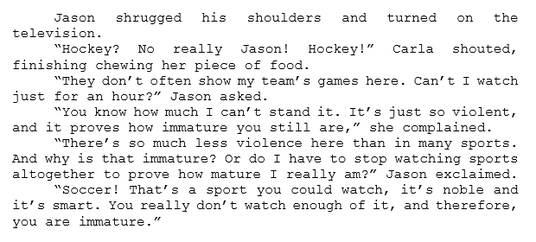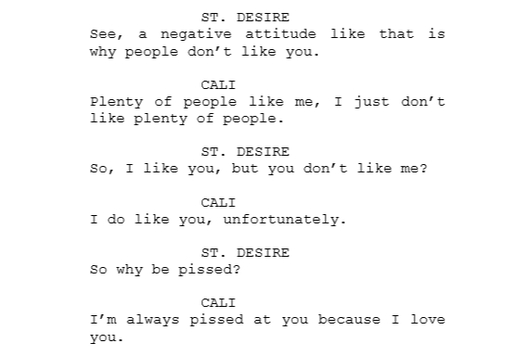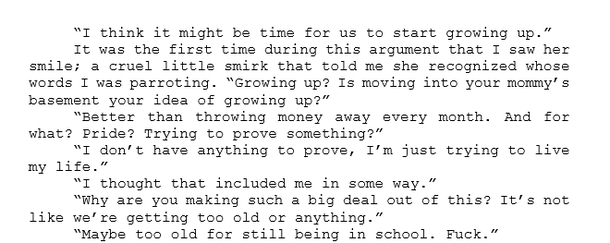Silver Wordsmith: An author's journey |
|
How many times are writers, especially beginner writers, told to write what they know? And in the face of that advice we routinely write about people we’ve never met, occupations we’ve never worked, or countries and even whole worlds that we’ve never visited. So even though we’re no strangers to the fantastical, how come it’s so difficult to make sure that something as basic as a conversation between two people doesn’t sound like a couple of aliens wearing people suits doing a poor job of trying to blend in? If you’re looking for sage advice from a master of realistic punchy dialogue, you’ve taken a bad turn somewhere and ended up on the wrong side of the tracks. If, however, you’re looking for the musings of a kindred spirit who seems to completely forget what human beings actually sound like whenever you pick up a pen, you might just be in the right place. Dialogue has never been my forte. In fact, it is pretty much the opposite of a forte. It’s like an Achilles heel, if Achilles had no heel and just hobbled around on one foot. Given that the initial bar had been set so low, it’s also an area of my writing that has seen a lot of improvement over the years. I think what would help here is to demonstrate some of that journey through excerpts of my old writing. I want to start doing that more and more here – sharing my very outdated writing – because through a little bit of self-deprecation, I think it might be encouraging for others to see that no matter where you start out, there’s always the possibility of improvement. Let’s dig all the way back to high school for an egregious example, where a character is introducing a new student in town to their clique of friends: “This is our world, Mikha; you are the newbie. We were a unit five: Billy, Harbir, Riley, Jonathan and I. Now all that has changed and we need to expand. We are now a unit of six. Mikha, welcome to the fold. I’m pretty sure you’ll find your place here very quickly. Good luck!” If you didn’t cry while reading this, then you’re made of sturdier stuff than me. I think the most egregious part of this, was this story was based on my school and my friends, and I am the speaker in this piece. Let me assure you that I, nor any other sane individual, have ever uttered anything resembling these words. Just look at the drama of “this is our world” and “welcome to the fold”, the ludicrous exposition of “we are a unit of five”, the needless reminder that the character is a “newbie”. Now let us take a look at following atrocity – an attempt at some serious drama between a husband and wife from around the same period of my life: Believe it or not, it was difficult to pick out the most cringe-worthy excerpt in this chapter that showcases Jason, the most annoying character that I ever created. The biggest sin of this particular piece of dialogue is the “I need to show a character’s personality and I will burn cities to get there faster” trope. Look how unreasonable Carla is – “shouting” and “complaining”. Look at her completely ludicrous statements about soccer, her weird insertion of “therefore” and lack of contraction in “you are”. Nobody talks like this, except when they’re written by a stupid male teenager going “hurr durr, bad wife”. This is dialogue that has become completely subservient to the plot, and Jason’s three hastily tied-together clauses in his second line of dialogue really seals that. I would also note that there’s four dialogue tags that aren’t the word ‘said’ – editorializing the speech instead of letting it flow. While we’re on the theme of couples arguing, let’s fast forward a few years into my college days, with an excerpt from a screenplay I had written: This doesn’t quite make my stomach turn in the same way but the dialogue is still ridiculously stiff. Cali’s first line is a bit of an edgy eye-roll, and the “so why be pissed” line just doesn’t sound like something a person would say and would be better off as “So why are you pissed?” or “so why insist on being pissed?” But even if we change it to that, it’s still a bit of a non-sequitur for Cali’s line – just because you like someone, doesn’t mean you won’t be mad at them for any reason. Of course, reading the whole exchange together you can see why I had tried to beat this dialogue into submission – its entire purpose was to lead to that final line, which, again, is some serious edgelord shit. Now, since we’ve already established a theme, let’s fast forward an entire decade to a story I finished a couple of years ago, where a young couple is arguing over their future, and where they ought to live: Wanting to use this in the context of showing improvement in my writing makes me have a particularly critical eye to this bit of dialogue as well. I’m still not the biggest fan of that first line – it’s a bit on the nose but doesn’t sound entirely unnatural. And I’m not sure how evident it is, but there was a definite intention to lead the whole conversation down to that final line, where the male narrator says something he immediately regrets. But let’s see what’s improved. Firstly, for you, who has no context for this story, the lack of dialogue tags probably immediately jumps out. I use them sparingly now especially where a lively conversation jumps between people as it does between these two. And the dialogue comes at you more in clauses rather than full long sentences, which does a better job of replicating how people actually talk.
I think even while fairly critiquing this last example, concessions can be made that my dialogue writing has shown vast improvement over the fifteen or so years represented here. There’s a few things I’ve gotten in the habit of doing to improve, and I wanted to share these here. One technique that I frequently use, which is endorsed by one of my creative idols, Lin-Manuel Miranda, and that is assuming the identity of your characters and having a conversation with yourself. This might mean having to dig in and channel any drops of thespian blood you might have, so that you can actually inhabit the characters and give justice to their voice. Because let’s face it, I don’t know about you, but I’d rather visit the dentist than have to read a whole book where it’s just basically five copies of me talking to each other. I often hear the advice that reading your work aloud is the best form of editing – allowing you to easily pick up typos and awkward sentences. While I often skip over this, given that I edit in places where I can’t be freely talking to myself, I want to stress that nowhere is this more important than dialogue. It makes sense, given that the words in the story are spoken out loud, and so the best test of them would be to actually listen to them. You don’t know how many times something looked passable on paper and then when I say it I realize no one would structure a sentence like this in natural speech. Often we’re tempted to have one punchy line that sounds really good in isolation, but in order to not feel forced, it needs to naturally follow a previous line of dialogue. So then I would structure that line to serve the “oomph” line and move on. And then as I reread, I realize how obvious it is that the preceding line of dialogue is only there to serve the next line. Conversations in fiction are meant to give the reader a sense of looking into a room and actually watching people talk. It shouldn’t serve as a jarring reminder that there’s an author in the background pulling the strings. That is not to say that leading to a punchy line should be avoided entirely, but great care should be taken to lead the reader to that line, and not drag them by their ear to it. In contrast, another thing I’m finding is that sometimes too natural can be just as off-putting. When we talk, we use crutch words, such as “like”, “well”, “you know” and so on. I find that having to many of these also interferes with the flow of words on the page. So a little compromise is necessary to really deliver a memorable product. I think I still have a long road of improvement ahead of me, but it’s nice to turn around and reflect on the journey that’s been taken so far, and some of the various techniques that have taken me there. Hopefully you can incorporate some of these into your writing to see improvements in this area as well.
0 Comments
Leave a Reply. |
Michael SerebriakovMichael is a husband, father of three, lawyer, writer, and looking for that first big leap into publishing. All opinions are author's own. StoriesUrsa Major Categories
All
Archives
January 2024
|
Proudly powered by Weebly



 RSS Feed
RSS Feed